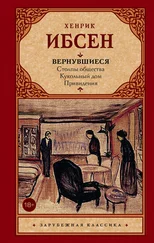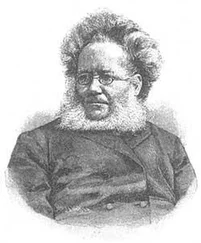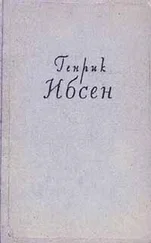Генрик Ибсен - Ghosts
Здесь есть возможность читать онлайн «Генрик Ибсен - Ghosts» весь текст электронной книги совершенно бесплатно (целиком полную версию без сокращений). В некоторых случаях можно слушать аудио, скачать через торрент в формате fb2 и присутствует краткое содержание. Год выпуска: 2014, Издательство: epubBooks Classics, Жанр: Драматургия, на английском языке. Описание произведения, (предисловие) а так же отзывы посетителей доступны на портале библиотеки ЛибКат.
- Название:Ghosts
- Автор:
- Издательство:epubBooks Classics
- Жанр:
- Год:2014
- ISBN:нет данных
- Рейтинг книги:3 / 5. Голосов: 1
-
Избранное:Добавить в избранное
- Отзывы:
-
Ваша оценка:
- 60
- 1
- 2
- 3
- 4
- 5
Ghosts: краткое содержание, описание и аннотация
Предлагаем к чтению аннотацию, описание, краткое содержание или предисловие (зависит от того, что написал сам автор книги «Ghosts»). Если вы не нашли необходимую информацию о книге — напишите в комментариях, мы постараемся отыскать её.
Ghosts — читать онлайн бесплатно полную книгу (весь текст) целиком
Ниже представлен текст книги, разбитый по страницам. Система сохранения места последней прочитанной страницы, позволяет с удобством читать онлайн бесплатно книгу «Ghosts», без необходимости каждый раз заново искать на чём Вы остановились. Поставьте закладку, и сможете в любой момент перейти на страницу, на которой закончили чтение.
Интервал:
Закладка:
Not until April 1886 was Gespenster acted in Germany, and then only at a private performance, at the Stadttheater, Augsburg, the poet himself being present. In the following winter it was acted at the famous Court Theatre at Meiningen, again in the presence of the poet. The first (private) performance in Berlin took place on January 9, 1887, at the Residenz Theater; and when the Freie Bühne, founded on the model of the Paris Theatre Libre, began its operations two years later (September 29, 1889), Gespenster was the first play that it produced. The Freie Bühne gave the initial impulse to the whole modern movement which has given Germany a new dramatic literature; and the leaders of the movement, whether authors or critics, were one and all ardent disciples of Ibsen, who regarded Gespenster as his typical masterpiece. In Germany, then, the play certainly did, in Ibsen's own words, "move some boundary–posts." The Prussian censorship presently withdrew its veto, and on, November 27, 1894, the two leading literary theatres of Berlin, the Deutsches Theater and the Lessing Theater, gave simultaneous performances of the tragedy. Everywhere in Germany and Austria it is now freely performed; but it is naturally one of the least popular of Ibsen's plays.
It was with Les Revenants that Ibsen made his first appearance on the French stage. The play was produced by the Théâtre Libre (at the Théâtre des Menus–Plaisirs) on May 29, 1890. Here, again, it became the watchword of the new school of authors and critics, and aroused a good deal of opposition among the old school. But the most hostile French criticisms were moderation itself compared with the torrents of abuse which were poured upon Ghosts by the journalists of London when, on March 13, 1891, the Independent Theatre, under the direction of Mr. J. T. Grein, gave a private performance of the play at the Royalty Theatre, Soho. I have elsewhere [1] See "The Mausoleum of Ibsen," Fortnightly Review , August 1893. See also Mr. Bernard Shaw's Quintessence of Ibsenism , p. 89, and my introduction to Ghosts in the single–volume edition.
placed upon record some of the amazing feats of vituperation achieved of the critics, and will not here recall them. It is sufficient to say that if the play had been a tenth part as nauseous as the epithets hurled at it and its author, the Censor's veto would have been amply justified. That veto is still (1906) in force. England enjoys the proud distinction of being the one country in the world where Ghosts may not be publicly acted. In the United States, the first performance of the play in English took place at the Berkeley Lyceum, New York City, on January 5, 1894. The production was described by Mr. W. D. Howells as "a great theatrical event—the very greatest I have ever known." Other leading men of letters were equally impressed by it. Five years later, a second production took place at the Carnegie Lyceum; and an adventurous manager has even taken the play on tour in the United States. The Italian version of the tragedy, Gli Spettri , has ever since 1892 taken a prominent place in the repertory of the great actors Zaccone and Novelli, who have acted it, not only throughout Italy, but in Austria, Germany, Russia, Spain, and South America.
In an interview, published immediately after Ibsen's death, Björnstjerne Björnson, questioned as to what he held to be his brother–poet's greatest work, replied, without a moment's hesitation, Gengangere . This dictum can scarcely, I think, be accepted without some qualification. Even confining our attention to the modern plays, and leaving out of comparison The Pretenders , Brand , and Peer Gynt , we can scarcely call Ghosts Ibsen's richest or most human play, and certainly not his profoundest or most poetical. If some omnipotent Censorship decreed the annihilation of all his works save one, few people, I imagine, would vote that that one should be Ghosts . Even if half a dozen works were to be saved from the wreck, I doubt whether I, for my part, would include Ghosts in the list. It is, in my judgment, a little bare, hard, austere. It is the first work in which Ibsen applies his new technical method—evolved, as I have suggested, during the composition of A Doll's House —and he applies it with something of fanaticism. He is under the sway of a prosaic ideal—confessed in the phrase, "My object was to make the reader feel that he was going through a piece of real experience"—and he is putting some constraint upon the poet within him. The action moves a little stiffly, and all in one rhythm. It lacks variety and suppleness. Moreover, the play affords some slight excuse for the criticism which persists in regarding Ibsen as a preacher rather than as a creator—an author who cares more for ideas and doctrines than for human beings. Though Mrs. Alving, Engstrand and Regina are rounded and breathing characters, it cannot be denied that Manders strikes one as a clerical type rather than an individual, while even Oswald might not quite unfairly be described as simply and solely his father's son, an object–lesson in heredity. We cannot be said to know him, individually and intimately, as we know Helmer or Stockmann, Hialmar Ekdal or Gregors Werle. Then, again, there are one or two curious flaws in the play. The question whether Oswald's "case" is one which actually presents itself in the medical books seems to me of very trifling moment. It is typically true, even if it be not true in detail. The suddenness of the catastrophe may possibly be exaggerated, its premonitions and even its essential nature may be misdescribed. On the other hand, I conceive it, probable that the poet had documents to found upon, which may be unknown to his critics. I have never taken any pains to satisfy myself upon the point, which seems to me quite immaterial. There is not the slightest doubt that the life–history of a Captain Alving may, and often does, entail upon posterity consequences quite as tragic as those which ensue in Oswald's case, and far more wide–spreading. That being so, the artistic justification of the poet's presentment of the case is certainly not dependent on its absolute scientific accuracy. The flaws above alluded to are of another nature. One of them is the prominence given to the fact that the Asylum is uninsured. No doubt there is some symbolical purport in the circumstance; but I cannot think that it is either sufficiently clear or sufficiently important to justify the emphasis thrown upon it at the end of the second act. Another dubious point is Oswald's argument in the first act as to the expensiveness of marriage as compared with free union. Since the parties to free union, as he describes it, accept all the responsibilities of marriage, and only pretermit the ceremony, the difference of expense, one would suppose, must be neither more nor less than the actual marriage fee. I have never seen this remark of Oswald's adequately explained, either as a matter of economic fact, or as a trait of character. Another blemish, of somewhat greater moment, is the inconceivable facility with which, in the third act, Manders suffers himself to be victimised by Engstrand. All these little things, taken together, detract, as it seems to me, from the artistic completeness of the play, and impair its claim to rank as the poet's masterpiece. Even in prose drama, his greatest and most consummate achievements were yet to come.
Must we, then, wholly dissent from Björnson's judgment? I think not. In a historical, if not in an aesthetic, sense, Ghosts may well rank as Ibsen's greatest work. It was the play which first gave the full measure of his technical and spiritual originality and daring. It has done far more than any other of his plays to "move boundary–posts." It has advanced the frontiers of dramatic art and implanted new ideals, both technical and intellectual, in the minds of a whole generation of playwrights. It ranks with Hernani and La Dame aux Camélias among the epoch–making plays of the nineteenth century, while in point of essential originality it towers above them. We cannot, I think, get nearer to the truth than Georg Brandes did in the above–quoted phrase from his first notice of the play, describing it as not, perhaps, the poet's greatest work, but certainly his noblest deed. In another essay, Brandes has pointed to it, with equal justice, as marking Ibsen's final breach with his early–one might almost say his hereditary romanticism. He here becomes, at last, "the most modern of the moderns." "This, I am convinced," says the Danish critic, "is his imperishable glory, and will give lasting life to his works."
Читать дальшеИнтервал:
Закладка:
Похожие книги на «Ghosts»
Представляем Вашему вниманию похожие книги на «Ghosts» списком для выбора. Мы отобрали схожую по названию и смыслу литературу в надежде предоставить читателям больше вариантов отыскать новые, интересные, ещё непрочитанные произведения.
Обсуждение, отзывы о книге «Ghosts» и просто собственные мнения читателей. Оставьте ваши комментарии, напишите, что Вы думаете о произведении, его смысле или главных героях. Укажите что конкретно понравилось, а что нет, и почему Вы так считаете.








